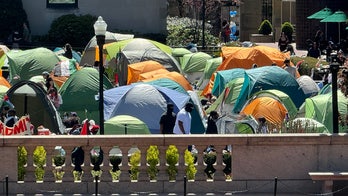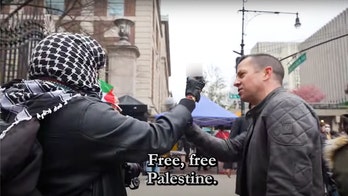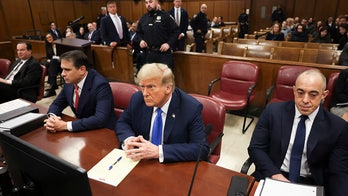Things are no longer so spicy in Caracas’ so-called “esquina caliente” (“hot corner”). Once the epicenter of Chavista proselytism, the Bolivar Square now stands mostly quiet, depleted perhaps after 16 years of intense advocacy on behalf of the Bolivarian Revolution.
A ballooning inflation, shortages of even the most basic staples and a leader half as charismatic as his late predecessor Hugo Chavez have taken their toll on Venezuelans — many of them now don’t want to hear a thing about politics.
On a recent afternoon, the red tent that the government’s party has held for more than a decade was being quietly occupied by 15 to 20 seniors who sat under the tent watching the state channel on a large TV screen.
The political mood has dropped to unprecedented levels.
“I won’t vote in the [June 28] primaries,” said a woman who asked to remain anonymous to not jeopardize her job with the government. “I am sick of politics because of all the problems we are facing. I can’t travel, money is not enough and even buying food is a difficult process now,” she told Fox News Latino.
- Decay and government neglect: Tough lessons at Central University of Venezuela
- U.S. investigating high-ranking Venezuelan officials for cocaine trafficking, money laundering
- Increasing number of products in Venezuela cannot be purchased in bolivars, only dollars
- Venezuelan socialist regime and opposition wage war over young voters
- Venezuela’s #2 targeted in U.S. drug probe has faced slew of corruption allegations
- Wife of Venezuelan opposition leader in 3rd week of hunger strike says they ‘won’t back down’
For years, the “hot corner” had been one of the city’s most active political places. Regime’s supporters always filled its red post to hand political leaflets and, in the periods of more confrontation, this was the setting for rough fights and screaming matches between both sides.
But things have changed over the last months, after March and April’s rallies against Barack Obama’s executive order sanctioning seven senior officials for money laundering.
The colorful propaganda that still fills Bolivar Square and its surrounding buildings seem to be invisible to the apathetic passersby, for whom Chavez’s face has become an unescapable part of their landscape, especially since his passing in 2013.
Other squares across Caracas and beyond are seeing a similar shift. In El Valle, a low-income section of the capital, the government’s red post was all but empty recently, with just a few people stopping by to ask about the candidates.
“Politics is the dirtiest thing in this country. I am even doubtful about voting in the general elections for the National Assembly,” Erasmo Rodríguez, a senior who was sitting in El Valle’s main square, said.
In other five squares visited by FNL around downtown Caracas the situation was similar. Some didn’t even have political propaganda anymore, a strange thing in today’s Venezuela.
According to Datanalisis, one of the top polling firms here, the political polarization in the country is weakening.
“The government's hard base of support is around 20 percent and the opposition has the same percentage. Fifty-nine percent describe themselves as independent and, of those, 20 percent opposes the government and yet are not part of any opposition party, " José Antonio Gil Yepes, Datanalisis director, told FNL. "The rest just don't like any political option,” he added.
Recently President Nicolas Maduro allluded to this new reality saying some segments of the society were under a “despolitization” process. He warned that this could lead to a loss for the revolution and said the government was in a mission to “repoliticize” the country.
According to pollster Gil Yepes, the remaining primaries will be a key part of that task — after so many years of polarization, he said, an important event such a national election is bound to energize the poles once again.
In the streets there are some signs of that. Francisco Vallenilla, a senior citizen in El Valle, was sitting placidly on a Caracas square on a recent afternoon, engaging in friendly chatter — until the issue of politics came up.
“I am going to support this government even if things are not well," he said passionately, "because it’s the best one we have had in decades”, after which he made a point of showing us his ID of Movimiento V República (Movement for the Fifth Republic), the party with which Chávez got to the presidency in 1998.




